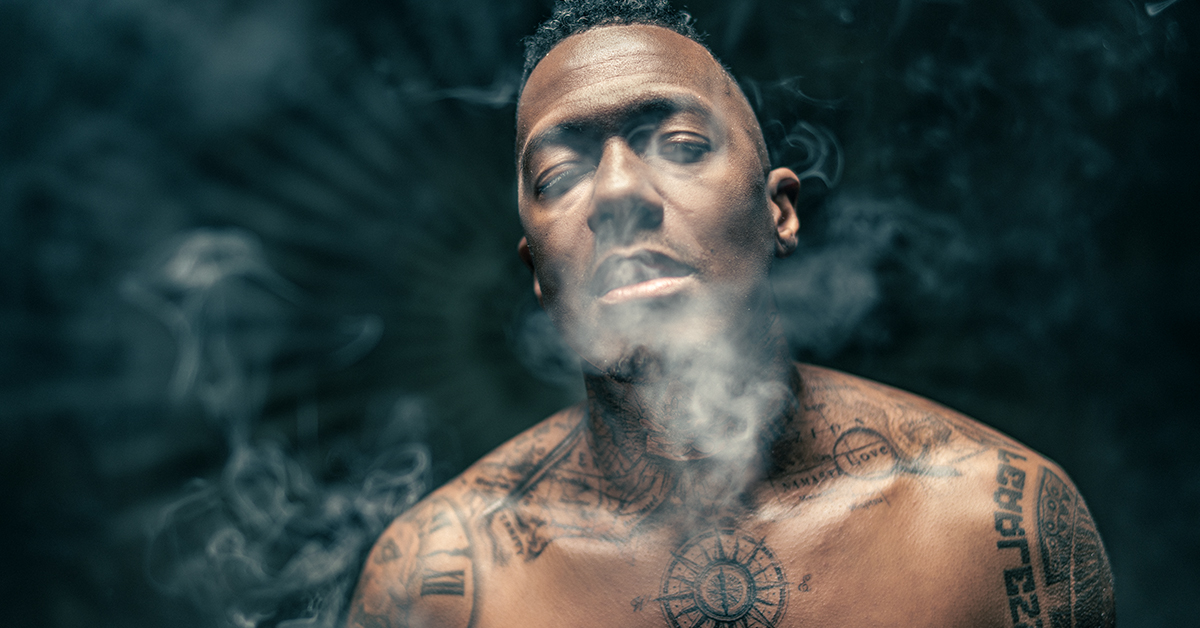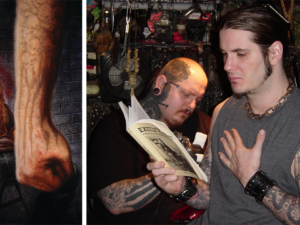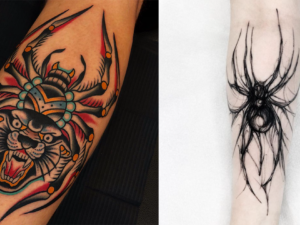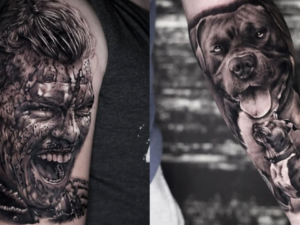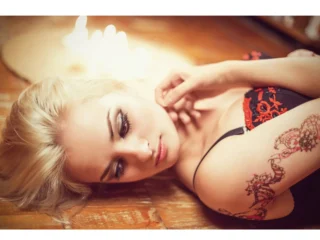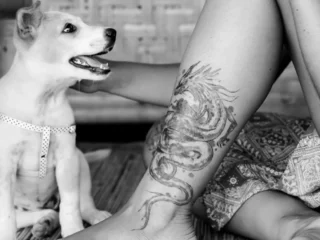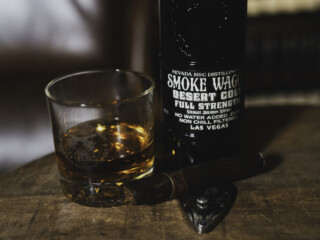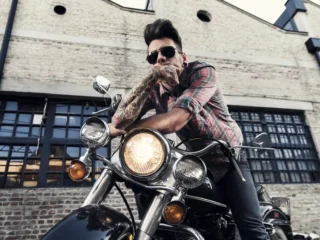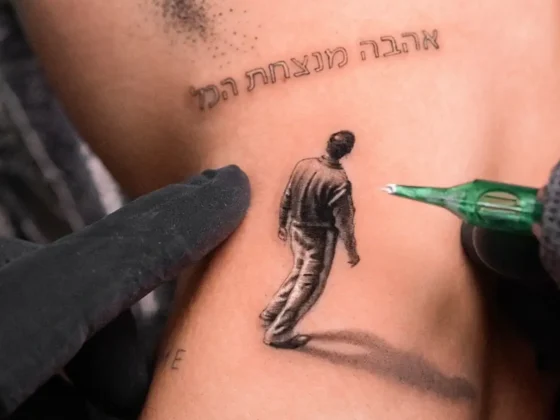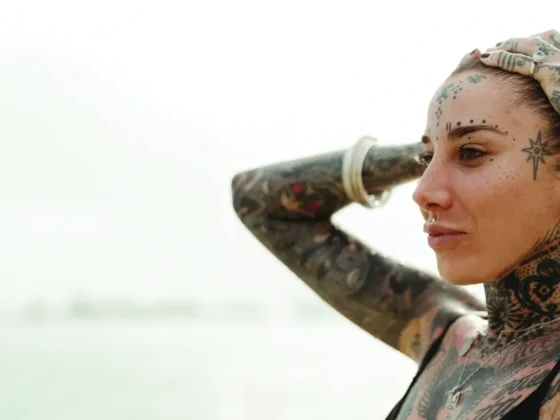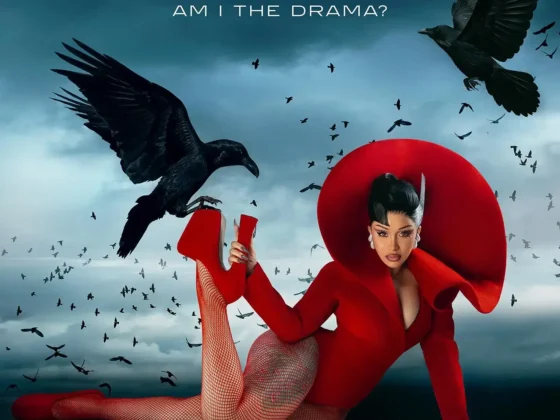Inked Mag
April 7th, 2021
Cannon’s Compass
Nick Cannon’s life has been a journey full of ups and downs, but through it all he has relied on his moral compass to guide him.
Edited by Charlie Connell
Nick Cannon’s life has been far from ordinary. Long before he was an internationally known entertainer, Cannon was just a kid growing up with his grandparents who was obsessed with music. Cannon wanted to pay homage to his incredible journey with a tattoo mapping out his past, present and future. Tattoo artists Maria Garza and Sherri Austria-Portela spent two days tattooing Cannon’s chest and neck here at Inked NYC, giving the entertainer a piece that spans many chapters. Afterwards, we sat down with Cannon to give him the opportunity to share his story, in his own words.
I grew up in southeast San Diego. I have “South East’’ tattooed on my forearm, which is where I was born. I was a kid, in government housing, really just trying to stay out of trouble. My parents were teenagers when they had me, so it was a little unorthodox situation. My father went away to be a minister. He actually left California so he would get out of trouble because he grew up a troubled youth. He just had a baby and he’s like, “I gotta get out of here.” So he went to college in North Carolina. My mom went to nursing school and it was really difficult trying to take care of me. My father’s mother stepped in as well and that trifecta of all of them was my upbringing.

My parents were teenagers, so we kind of grew up together. They were trying to get their lives right while blazing a path for me.
[There] was always youthful exuberance around because everybody was young. I remember when my grandmother was my age right now, that’s weird [laughs]. It was really just a loving environment. Obviously, there wasn’t an abundance of anything, really, other than just love and compassion for each other. We made do with everything else.I would have to say that my first love was probably music. It started in the church, obviously I grew up in the church. Gospel music… as well as gangster rap, it all happened for me at the same time, ironically. Growing up in Southern California, I was mesmerized by Ice-T, NWA, Too Short and all of that. But at the same time I grew up in a Baptist church that had amazing music.
Those are probably my two introductions to falling in love with music. I could be a musician, but also I could be a rapper.
I had, like, my first demo tape at 8 years old. I was telling jokes onstage, doing stand-up, by the time I was 11. All of that stemmed from the church, it all came from having an audience and a congregation to actually get my feet wet in those spaces. I started off telling jokes and opening up for my dad who was a preacher. Even before that, it’d be different church musicians, friends of the family, who would have studios in their garages and they would let me do stuff. I was a young cute kid who had some rhythm so I figured out how to play a few instruments and how to rap. My pre-teen and adolescent age was full of just trying to figure it all out.
When I was 8, I rapped about cars, cartoons and girls. I think I remember all of those songs. I can’t rap now, but at 8 I was really bad. It was something like, “Lamborghini, Ferrari, Mercedes-Benz. To get one of these you gots to have ins. Talking about dollars, in other words, big bucks. You can’t go riding in those farmer trucks [laughs].” But I wrote that when I was 8, I thought it was pretty good.

For Christmas one year, my grandfather, who had passed away, left me a bunch of synthesizers. In the late eighties that stuff was rare. I learned how to make beats before I was 10 years old. I could have four track players and keyboards with sequencers on it, I would just use the drums that were already programmed and rap over it. I was nicer at the beats and DJing than I was at the lyrics.
That’s what started me wanting to be more behind-the-scenes with music, and my dream was to be a producer. I did it but the other stuff was more successful. I just wanted to be a music producer. I wanted to have artists. I wanted to have people signed to my label, which I still currently have a label and sign artists all the time. I think people think of that as, like, my ancillary business, but growing up I just wanted to make beats and produce artists. That was really the dream.
Stand-up was something that really kicked the doors open for me. While I was still in high school I would go to talent shows and do stand-up, do music in my rap group, dance… I’d do all of this stuff and get first, second and third place. Still to this day I have this almost ADD-like energy that has me bouncing from one thing to another.
My career is all over the place, I’ll be the first to say that. I come from being a fan of people who are multi-faceted, that’s what you had to be to succeed in entertainment back in yesteryear. Bob Hope could do everything, like star in a movie, host the Oscars, do stand-up, those USO shows. He was everything and he was his own manager, it was pretty impressive. I’m kinda cut from that same cloth. I always say, to define me is to confine me. You can’t put me in a box.

We had fun creating “Wild ‘N Out.” Growing up in these stand-up clubs, you spend a lot of time with the same guys standing in front of the club in the cold waiting to go on stage and you just do stupid stuff. You talk about each other’s mothers, you freestyle rap, you play little improv games. I kind of meshed the world of “Whose Line Is It Anyway?” with hip-hop. And really, this was just the stuff that we were doing hanging in the different comedy clubs. It’d be myself and Kat Williams, Kevin Hart, all these different people. And they’d be like, “Yo, you doing movies and stuff like that. Why don’t you give us a job?” I really created “Wild ‘N Out” to get my friends jobs and opportunities. To this day, it’s created so many opportunities and been a launching pad for so many wonderful careers. It goes all the way back to when Kevin Hart was broke and I was like, “I’ll give you a job.”
I’m not moved by fame, money, etc. partly because I had such a strong upbringing in reality, being grounded and being very comfortable with oneself. My nature is to fall back. I’m probably the quietest person in the room. If I got to turn it on, I definitely know how to do that, but I’ve never been one of those people. As I got older, I didn’t want the attention. I loved the art form, but I didn’t necessarily want to be in the public eye in that form.
But I also understood how to play the game. I was told by someone very wise, “Learn to manipulate the media or else the media will manipulate you.” And that’s kinda what I’ve lived by. I give people just enough. I’m very outspoken, I’m very free with my thought process, a critical thinker, but I’m also open-minded and we’ll have a discussion about anything, I don’t care what cameras are around. I also know how to keep my private life private. I’m not salacious trying to be like, “Hey, look at me. Look what I’ve achieved, look what I have. Sometimes people think that’s to my detriment because I have done so much in the space of business and entertainment, but I’m not seeking to be on people’s lists, I don’t care about “Forbes” or any other kind of awards or accolades. It’s never been my vibe because I have a true love for the arts more than anything.

I guarantee you, if I would’ve come up during the Harlem Renaissance, I probably would have been a jazz musician. Somebody that could just be in the back chilling and still probably be talented beyond belief, but not really looking to be the showman. It’s a weird dichotomy because I have the ability to do both—I’m a natural introvert and loner, but if I need to be the life of the party, I know how to do that too.
It’s interesting when you’re married to one of the most famous people in the world, a lot comes with that. I think I was built for that situation because, again, I knew how to play my position per se. It was never something where I was upset by the scenario I was in. We played along with everything. From marriage to even having children, we knew the public was going to be interested and wanting to have the conversation. So we never shied away from any conversation, but we were also allowed to keep several things private.

Then when you have twins, twins are automatically superstars, even if your infants are just in your family. They were kind of born into this greatness of attention from the moment they came out. I believe with life you can have two optics on it— either you can complain and be on a low frequency or you can just be all quality, optimistic and joyous. That’s how I’ve always viewed my life. I’ve never really had an issue with people being in my business. It was fun and it still is. I’ll never be one of those people in entertainment who complains about being too well-known. That’s silly.
I’ve always wanted to go back to school on some Rodney Dangerfield stuff, I’m going off a diving scholarship [laughs]. Academics has been something rooted in my family for quite some time. My grandmother right now is 101 and she didn’t care about anything, she still doesn’t care about any of the stuff I’ve accomplished, except for school. And that’s so cool, that’s where she comes from, that’s true success to her generation. They don’t care how much money you make or what status of life you have. Education is true wealth. Early on, as much as I would have wanted to go to college, I couldn’t afford it. I was still helping my mom pay rent and trying to figure it all out. So once I figured out I could do this and make a living out of it, when it was all said and done, by the time I had children, I was like, man, I might as well just go ahead and take a swing at this.
I got my degree in criminology with a minor in African studies. And I’m still going! My master’s in psychology is right there, and then ultimately a PhD in divinity. So hopefully by 2025 I’ll have all of that accomplished.

I have done a lot of work in the prison systems and charitable efforts and helping juveniles that were tried as adults and people coming home and reform systems. [Criminology] was a world that I knew a little bit about, but I never wanted to be one of those people in the public who when it’s time to protest they don’t have the information. I don’t want to talk down on anybody because I think any time someone takes their celebrity and uses it for good, it’s an awesome thing. When I’m put in those situations I want to know what I’m talking about. I want to be someone who’s well educated in that space and really living a life. When someone sticks a camera in my face and says, “Hey, why are you protesting?” I can articulate it in a manner that goes all the way back to our history and how things have been enforced and perpetuated since the beginning.
It’s interesting because my podcast was created at school. That was a way that I did a lot of my homework, it was specifically the idea of one of my closest professors and mentors, Dr. Greg Carr. When I needed to give a presentation we’d schedule some time weekly to go over a lot of the texts in the Founders Library at Howard. We thought, “Let’s turn this discussion about the book I read into a podcast.”

We get deep all the time, it’s like a storm of so many different ideas and times. We talk about everything, but the one that got me in trouble, I think it was probably more than just [the discussion] of those concepts, ideas and what are considered tropes, came during a time where everybody was just in so much pain. I felt like it was this zenith of a moment for the attention to get on topics that people really weren’t ready to discuss.
I think ultimately there were probably four different things [I did] that could be taken as an apology. I’m actually doing a book about the psychology behind apologizing—who is the apology for, for example—all inspired by this situation. People want to hear certain terms to make them feel better, which is fine. But that seems very temporary. If there’s truly an issue and you feel like these things are constantly occurring in various communities, let’s unpack that. Let’s have discourse about why there are certain tropes. Why are these things trigger words? Why is this true? Why isn’t this true? A lot of people weren’t really ready to do the hard work. A lot of people wanted to just immediately judge or immediately say, “Cancel this person.” And it’s those individuals that ultimately end up on the wrong side of history. Not to say that I’m always doing everything right, but if you know my heart and you know my purpose… The truth is something you never have to protect because it’s always there. Dr. John Henrik Clarke said it the best: Sometimes you can talk about the right things in the wrong way. Ultimately, that’s the very delicate line my podcast walked for some time.

People who are actually hurt and offended, hopefully they now know that that was never my intention. It was one of those things where I leaned into it. I didn’t run away from the idea. I said what I said and I want to understand why that hurts you. I want to go deeper. I met with some outstanding rabbis and people from the Jewish community, even people from the alt-right community, and we sat down and really had the discussion of race, had the discussion of origins. These are things that people are interested in and want to talk about, but if you aren’t educated or knowledgeable, that’s where tropes are created, that’s where ideas can turn into folklore.
We’re experiencing a paradigm shift and people are trying to find that moral ground. They need that compass to take them to the place where they can say, “This is where I stand. This is what I believe. And I’m not offending anybody by believing that.”
[Gesturing to his fresh tattoo] A compass, to me, can be so many things. It can be a fortune teller, it can give you your future, it can give you your direction. It can show you your balance. It gives you substance in a way, let’s you know you have a plan. Keeps you grounded.Coming up I was very clean-cut. I was raised by the book, and by the book, I mean the Bible. I was only allowed to have certain types of haircuts, I couldn’t get my ears pierced. Tattoos were so taboo—your body is a temple—and I rocked with that for a while, most of my life. I wanted tattoos, I liked them, but I was like, “Nah.” They were always associated with negative aspects for me growing up. Luckily I got over all of that.
I was 28, out there in the public eye in a big way, flaunting my relationship, so I thought, “Alright, I’ll get my wife’s name sprawled across my back.” That was my first tattoo. [Laughing] It’s part of what’s back there now, I have a collage of tattoos [over it]. I enjoy those types of tattoos, where they tell the story of one’s life, not just a linear perspective of when they got it, but more about what their mindset was, what they did and didn’t do, what they are trying to cover up. It goes to show that they’re really about that tat life, not that they just went out and got a cool sleeve.

I think it started with my sleeve, but I wanted my tattoos to say something. I wanted to tell a story, sort of a left brain/right brain vibe. Everything on my right arm is really artistic and it feels historic and analog. My left arm is my digital arm, it’s everything from digital time to Nintendo controllers to the Terminator to the gears up here.
We have the digital and the analog, left brain/right brain, and I wanted to bring it all together. So with the compass in the center of my chest—some very Iron Man vibes, but a spiritual Iron Man [laughs]—I always felt like I’ve been on a journey. And my journey is ongoing, it’s multi-dimensional, so I put a map going all the way up the neck, marking the various places in my life, past, present and future.
I was the person who didn’t have tattoos. If you looked at me in 2008, I’d be like, “Man, I won’t get no tattoos.” Now, from my neck on down is covered in tattoos. I’ve stayed away from the hands for when I want to keep it clean, but I’m thinking about it. I don’t think I’ll do the hands or the face, I’ll stay away from those. But I’m already at my neck, so you never know [laughs].

Watch Nick Cannon explain each element of his new tattoo on YouTube.
Editor's Picks
Paul Booth Illustrates Cover for Pantera Graphic Novel
The revered tattoo artist created a cover for a graphic novel celebrating the 30th anniversary of “Vulgar Display of Power”
Scary Spider Tattoos
Spiders are terrifying, yet for some reason people sure do love to get tattoos of them

